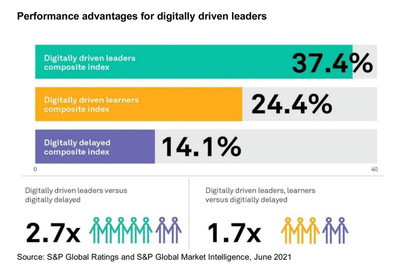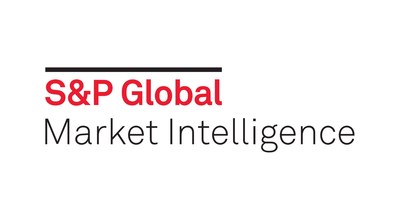S&P Global Market Intelligence Information Technology Outlook Report finds that digitization leaders outperform in equity and credit markets
The 2022 Information Technology Outlook from S&P Global Market Intelligence reveals that digitization can enhance enterprise performance in equity and credit markets by 2.7 times. The report highlights the importance of customer experience, hybrid infrastructure, AI, and workplace technology innovations. Key findings include a rise in formal digital transformation strategies to 54%, with many enterprises increasing cloud workloads. Cybersecurity demands have spurred over USD 5 billion in M&A activity. The report underscores the necessity for organizations to leverage data and adapt to evolving workplace expectations.
- Digitization can enhance performance in equity and credit markets by 2.7 times.
- 54% of businesses have formal digital transformation strategies, up from 43% in 2019.
- 54% of enterprises are increasing cloud workloads, with 57% using a hybrid cloud model.
- 35% of employees would accept a job for better workplace technology.
- M&A activity over USD 5 billion driven by cybersecurity needs.
- 72% of organizations with machine learning are concerned about AI's environmental impact.
LONDON, Nov. 11, 2021 /PRNewswire/ -- Digitization can enhance enterprise performance in equity and credit markets by 2.7 times, according to the newly released 2022 Information Technology Outlook from S&P Global Market Intelligence. Customer experience, hybrid infrastructure, cyber security, artificial intelligence (AI) and workplace technology are driving change in the industry and this report examines how their impacts will play out in the year ahead.
Published by 451 Research, the enterprise technology research unit of S&P Global Market Intelligence, the report spotlights the impacts of digitization in customer experience, the need for workplace technology innovation and digital enhancements including machine learning and automation to manage and secure the digital infrastructure required to keep organizations competitive.
"Organizations have to become more data driven and build skills across their business lines to put data to work to serve their customers, employees and partners," said Eric Hanselman, principal research analyst with 451 Research. "Enterprises will have to become skilled at managing and securing a hybrid collection of resources and services, if they're to remain competitive in their markets and be an attractive place to work."
Based on insights and survey data from 451 Research, key highlights from the report include:
- Formal digital transformation strategies have accelerated over the past decade as
54% of businesses have formal strategies in place, up from43% in 2019 and29% in 2016. 54% of enterprises are increasing their proportion of workloads on cloud, with57% reporting use of hybrid cloud model.- With the "Great Resignation" underway, workplace technology is playing a greater role in where people choose to work.
35% said that they were likely to accept a new job if the only way it differed from their current job was better availability of devices, applications and other productivity tools. 72% of organizations with machine learning in production say they are either 'very' or 'somewhat concerned' about the environmental impact of AI, but operational deployments of AI can reduce energy consumption.- Cyber security requirements for digitization and other tech initiatives have driven over USD
$5 billion in M&A activity in the last year.
The S&P Global Market Intelligence 2022 Information Technology Outlook Report is part of a "Big Picture Outlook" series published by the division's research group that provides a look ahead to key strategic trends and opportunities. To learn more about this "Big Picture Outlook" research series, please visit here.
To request a copy of the report, please contact pressinquiries.mi@spglobal.com.
S&P Global Market Intelligence's 451 Research unit provides expert analysis, proprietary data, and timely thought leadership for the high-growth emerging technology sectors. This enterprise technology research offering complements S&P Global Market Intelligence's broad universe of research sector coverage including energy, financial institutions, metals & mining and TMT (Technology, Media and Telecom).
S&P Global Market Intelligence's opinions, quotes, and credit-related and other analyses are statements of opinion as of the date they are expressed and not statements of fact or recommendation to purchase, hold, or sell any securities or to make any investment decisions, and do not address the suitability of any security.
About S&P Global Market Intelligence
At S&P Global Market Intelligence, we understand the importance of accurate, deep and insightful information. We integrate financial and industry data, research and news into tools that help track performance, generate alpha, identify investment ideas, perform valuations and assess credit risk. Investment professionals, government agencies, corporations and universities around the world use this essential intelligence to make business and financial decisions with conviction.
S&P Global Market Intelligence is a division of S&P Global (NYSE: SPGI), the world's foremost provider of credit ratings, benchmarks and analytics in the global capital and commodity markets, offering ESG solutions, deep data and insights on critical business factors. S&P Global has been providing essential intelligence that unlocks opportunity, fosters growth and accelerates progress for more than 160 years. For more information, visit www.spglobal.com/marketintelligence.
Media Contact
Sabrina Mayeen
S&P Global | Market Intelligence
+44 (0)20 7176 0495
Sabrina.Mayeen@spglobal.com
![]() View original content to download multimedia:https://www.prnewswire.com/news-releases/sp-global-market-intelligence-information-technology-outlook-report-finds-that-digitization-leaders-outperform-in-equity-and-credit-markets-301421558.html
View original content to download multimedia:https://www.prnewswire.com/news-releases/sp-global-market-intelligence-information-technology-outlook-report-finds-that-digitization-leaders-outperform-in-equity-and-credit-markets-301421558.html
SOURCE S&P Global Market Intelligence









